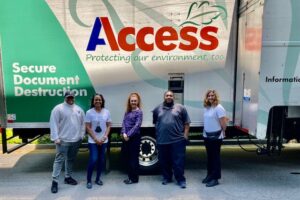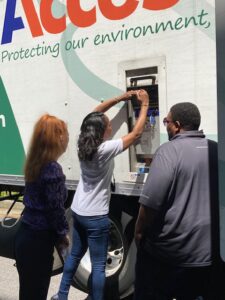As Emory’s records manager, I understand the significance of recycling, and in my role, I encourage destroying items that are eligible for destruction. So, what better way is there to destroy items than to recycle those that are recyclable? Although no specific person is responsible for the creation of recycling, it has been a common practice throughout history and dates back to ancient times.
What exactly is recycling? Quite simply, recycling is returning waste to production or collecting trash and changing it into new products that can be utilized again. Recycling helps us reduce waste, prevent pollution, conserve energy and natural resources, and produce financial benefits, like providing jobs and creating new useable products. I encourage recycling whenever and wherever possible. It is also important to note that recycling is an act of responsible green citizenship. The recycling industry is an economic powerhouse, creating in excess of $100 billion in revenue and more than a half million jobs in America.

Dr. Bennett, the author, with Access Secure Document Destruction and a member of the Emory community at Emory’s Earth Day recycling event
On Earth Day and my birthday (April 22), I worked with Emory’s Office of Sustainability, Emory Recycles, and others to host a major recycling event at Emory Point. Although the main focus of the event was the collection of hard-to-recycle items, my focus was primarily on the collection of confidential and sensitive documents that were eligible for destruction and needed to be shredded and then recycled. The Emory community and employees were able to do some spring cleaning by getting rid of recyclable items that were cluttering their homes, offices, and spaces.
This daylong event – celebrated during Earth Month and Records and Information Management Awareness Month in April – invited the public to dispose of unwanted household items and presented a chance for the local community to recycle hard-to-recycle items.
This year’s event was very successful in that all the community partners (Access, America’s Thrift Store, Clean Harbors, and Georgia Container Premier Surplus) were very well prepared and ready to accommodate a vast number of participants. The disheartening part of the event is that turnout was low as compared to previous years. I am unsure why participation was low this year, but we hope that participation vastly increases in the years to come.
Much thanks to our community partners and those who participated from Emory and throughout the community. Your commitment to a greener community and your community’s recycling efforts is greatly appreciated. To ensure vast participation in next year’s event, you can start now collecting those hard-to-recycle items that are typically not allowed in your curbside recycling collection bins outside your home. Some of these items include:
· Textiles
· Games/toys/bikes
· Kitchen materials, cooking oils
· Furniture/appliances
· Mattresses
· Paints/aerosols
· Batteries
· Bulbs (fluorescent, halogen, LED, incandescent)
· Tires
· Electronics (laptops, tablets, monitors, printers, wires, batteries)
In addition, please remember your confidential and sensitive paper items can be recycled after they’re shredded, including tax returns, credit card statements, and personal documents that may include confidential information, like your social security number and banking data.
Please also remember to recycle your common items as much as possible. These items include:
· Cardboard
· Newspapers
· Aluminum cans
· Glass containers
· Paperboard
· Steel cans
· Hard plastic items with no lids
· Magazines
· Mixed paper
You may think that everyone recycles because of the dramatic push to recycle across the nation, but approximately 40% of items that are trashed by Georgians could have been recycled. So, please do your part and recycle!
—Dr. Tishangi Bennett, Emory’s records and information manager

